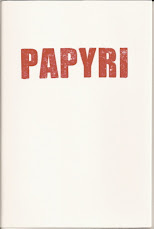The Villa of the Papyri is a house in Herculaneum, near Naples. Historians believe that it may once have belonged to Julius Caesar’s father-in-law, Lucius Calpurnius Piso. During the eruption of Vesuvius in AD 79 it was completely covered in lava. Parts of it were excavated in 1765 by Karl Weber, though many sections remain unexplored to the present day.
Piso was an historian and a philosopher, who owned an extensive library of papyrus scrolls. It is thought that some attempt was made during the eruption to evacuate these books by packing them into cases and carrying them out through an underground tunnel. The slaves deputed for the task were overtaken by poisonous fumes, however, leaving approximately 1800 papyri as carbonised spills in the lower levels of the villa.
Developments in multi-spectral imaging during the 1990s have made it possible to decipher the texts on these burnt scrolls, and a number of appeals have been made to the international scholarly community to expedite the recovery of this largely untouched library from ancient Rome. The treasures within it might include the lost books of Livy’s History of Rome, poems by Sappho and Anakreon, unknown plays by Sophocles and Euripides …
The Italian government’s official position is that even modern excavation techniques are not sufficiently advanced to guarantee the scrolls’ safety, and that they are therefore best left where they are at present. Other scholars fear that they are being gradually leached away and destroyed by the floods endemic to the region.
Why have these scrolls not yet been dug up and read? What is it the authorities fear about them? Which long-cherished theories and ponderous speculations would they give the lie to? This is possibly the greatest opportunity mankind will ever have to recover the lost literature of classical antiquity, the books and scrolls feared lost forever in the burning of the fabled Library of Alexandria (whose destruction began – coincidentally? – when Julius Caesar set fire to the city’s docks whilst defending his mistress Cleopatra, during a domestic dynastic struggle).
Up to now all we’ve been able to recover of Greek and Latin literature – besides the books copied and recopied by medieval monks, or translated into Arabic by Islamic scholars – has been a few fragments of papyri: mostly letters and accounts (with the occasional precious line or two of poetry) preserved in the sunbaked dryness of the Egyptian desert.
The treasures of Herculaneum must frighten someone, somewhere, very much indeed for them to have been left to rot in a waterlogged ditch for over two centuries ...
Poems, Imitations & Translations
Monday
The Villa of the Papyri
Subscribe to:
Post Comments (Atom)








.jpg)
4 comments:
I follow this issue extensively. I agree with you in that the findings within the Villa of the Papyri may represent the greatest untapped source of knowledge unto the Classical period extant on the surface of the Earth in 2007.
However, is there something so dangerous that it is being purposely hidden? Eh ... likely not. This whole mess grows out of the endemic inability of the modern Italians (unlike their historico-genetic predecessors) to, for lack of a better prhase, get their collective asses in gear.
It's disgusting, sickening, disturbing, and frightening. However, I don't think it will last forever. The intellectual lure is too great. People will organize against this static attitude.
I agree - no need for yet another conspiracy "theory" --: over the centuries, it took a while even to realize that those lumps WERE scrolls. And it was only relatively recently suspected that there might be another, "main" library in the villa. Finally, the Italian government, considerably burdened already by its massive load of antiquities, does have to think about priorities occasionally. All this seems normal and aboveboard enough....
Fair enough. It's pretty frustrating, though -- they could all be laundry lists, of course, but in that case why go to such elaborate lengths to save them? I really really want to read those scrolls. I know it's a tall order even to access them, let along decipher them, though, so I agree that the conspiracy theory is not helpful ...
"It is thought that some attempt was made during the eruption to evacuate these books by packing them into cases and carrying them out through an underground tunnel."
In my studies I've never heard this theory. Some were being packed into cases probably for escape but no tunnel as yet been found that dates back to antiquity. Author might be confused with the extensive tunneling done by Weber et al during early excavations.
As I've suggested elsewhere, micro-crawlers with cameras and lights could enter the actual library through 17th and 18th century dug tunnels (that were loosely back-filled)and then assess the condition of the papyrus still there. Weber admitted to having left some scrolls that he thought were too fragile to remove.
Post a Comment